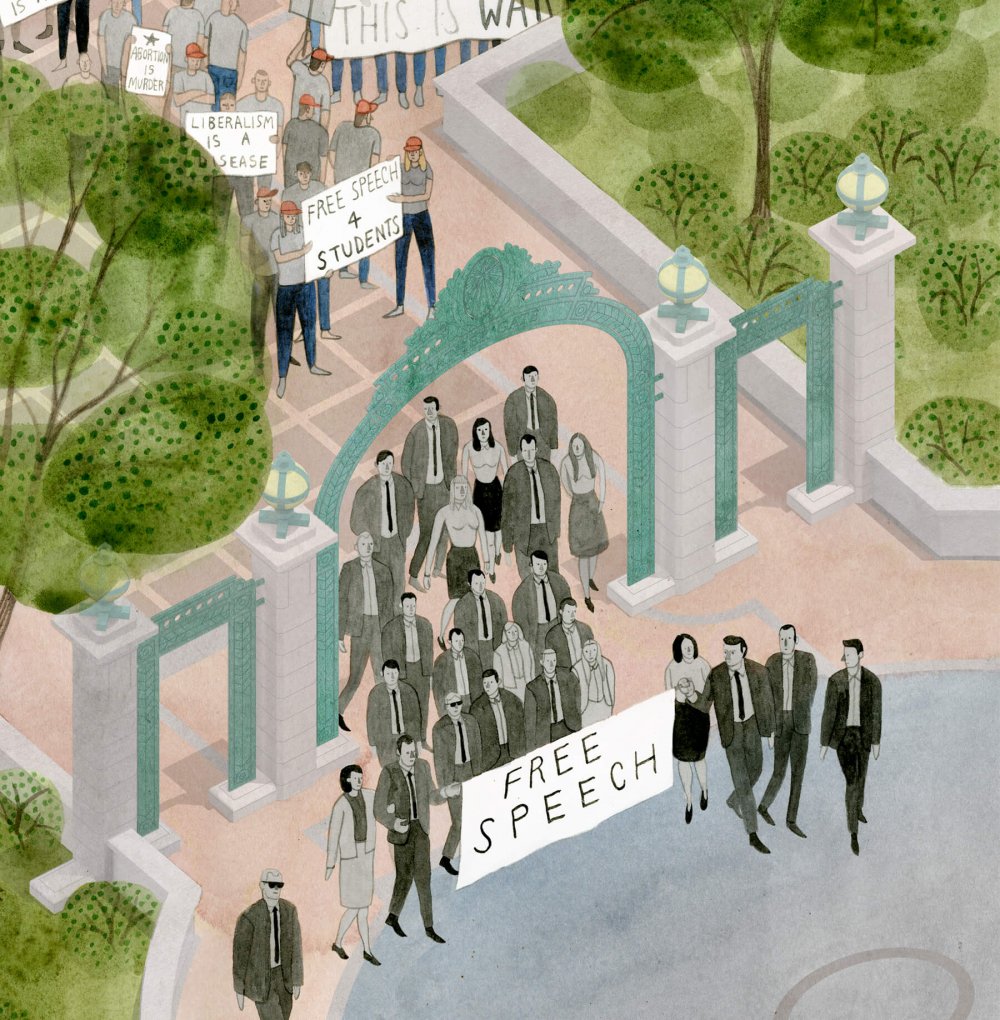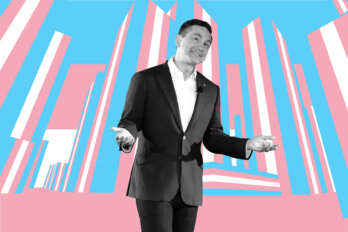In october 1794, the year that saw the resolution—via the ceremonial beheading of its leaders—of the French Revolution’s so-called Reign of Terror, the German philosopher Immanuel Kant was the subject of a royal proclamation. Issued by Enlightenment-era Prussian monarch Frederick William II, the despot’s denouncement expressed his “great displeasure” with Kant’s book Religion within the Limits of Mere Reason and the critique of Christianity contained therein. Kant was challenged for his “misuse” of philosophy and ordered to never publicly take issue with Christianity again.
Kant replied with The Conflict of the Faculties, a book that justified his circumvention of government oversight. “Only scholars can pass judgment on scholars as such,” Kant wrote. And philosophy, among all scholarly activities, is the discipline that is “free to evaluate everything.” This prizing of philosophy (which at the time encompassed many academic disciplines) above more instrumentally useful areas of study, such as medicine and law, explains why the highest academic degree one can receive is the doctorate of philosophy, or PhD. And Kant’s measured defiance of Frederick William II went a long way to entrench academic freedom as a keystone of higher education.
Kant, who was not just a professor and lecturer but also worked in various advanced administrative capacities, believed in a strict system of higher learning based on academic mentorship, the rigorous accumulation of knowledge, and the watchful protection of that knowledge. This exacting standard, which flowered across subsequent centuries of higher education, is the foundation upon which the Western university system is built.
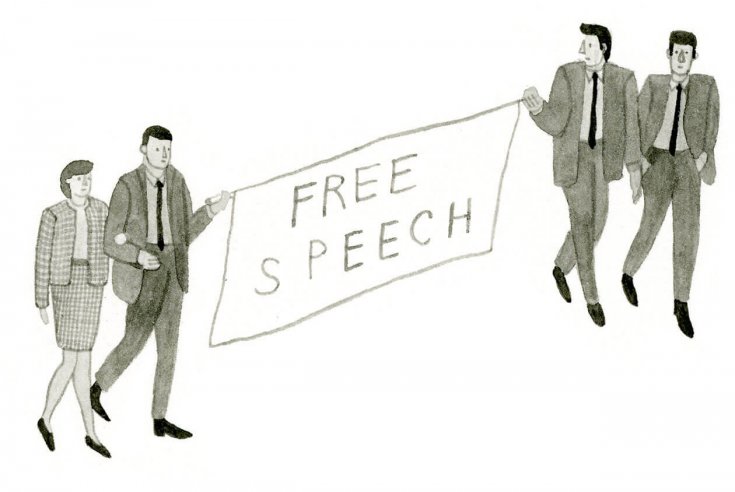
Kant’s emphasis on the freedom to evaluate ideas may suggest, to modern readers, a kind of free-for-all, a baggy latitude and do-what-thou-wilt conception of academic authority. But what Kant was driving at, in this delineation of academic gatekeeping and scholarly certification, was demonstrably more nuanced. He was after freedom from tyranny—from uninformed, bad faith interference. Scholars were entitled to tell their emperor to take a hike not because of some reductive notion of freedom as an unchecked intellectual id but precisely because their thinking was subject to strict standards of inquiry that conferred their own kind of authority. The pursuit of knowledge demands (and operates in the service of) liberty, yes. But it is also intrinsically rule bound, structured by standards of evidence, argumentation, and accreditation.
This is a rigid and sometimes unyielding system, to be sure. Humans are frail and full of prejudices, prone to peddle stupidity (sometimes unknowingly) in the service of power. Kant himself was, in addition to being arguably the most serious thinker of the Enlightenment, a tremendous racist and misogynist. But the very rigidity he espoused is premised on the capacity for revolution, as academic disciplines incorporate new discoveries (say, that the sun and not the earth is at the centre of our solar system) and academic institutions accommodate new standards of scholarship and accept new scholars.
Often, those revolutions begin outside the classroom. In the 1960s, the administration of UC Berkeley famously banned on-campus political activity in response to activism and rallies: students had, among other things, participated in campaigns to support registering African Americans in the South to vote. Protests in defiance of the ban spread in turn to other campuses, also developing into activities protesting the Vietnam War, and gave credence to both the merit and the efficacy of on-campus demonstration. Like Kant, these students understood the importance of pursuing their ideas independent of government interference, and their protests were all undertaken under the banner of the “free-speech movement.” (“We’re human beings!” bellowed dissident Mario Savio during a famous speech delivered on the steps of Sproul Hall in December 1964, protesting the manner in which Berkeley’s administration treated the students not as individuals, but as “raw material.”)
Two decades later, another wave of free-speech debates took hold, as students in the 1980s and 1990s demanded that universities expand the campus’s intellectual franchise to include those who had been previously ignored or deliberately silenced and to expand the curriculum to account for these people’s insights and ideas: course offerings in subjects like women’s studies expanded considerably, and the canon that formed the spine of literature departments became the subject of substantial criticism. The revolution had worked its way to the very centre of university life. Modern university and colleges campuses are now once again beset by waves of controversy about freedom of speech and expression: from hoary old Cambridge University (where professors were criticized in the media for, entirely of their own volition, issuing “trigger warnings” in Shakespeare lectures) to a UC Berkeley of more recent vintage, where a 2017 “Free Speech Week” event (advertising white supremacist speakers including Steve Bannon and Milo Yiannopoulos) was met with massive protests and mounting security fees. But these protests are unfolding quite differently: the current controversies about freedom of speech and expression are, to a great extent, a backlash to the fights of that last generation. Contemporary free-speech advocates are more likely to challenge the legitimacy of the very groups that were struggling to be recognized not that long ago; the speech they demand freedom for is speech that criticizes, undermines, and potentially jeopardizes others on campus, both as individuals and in their contributions to intellectual life.
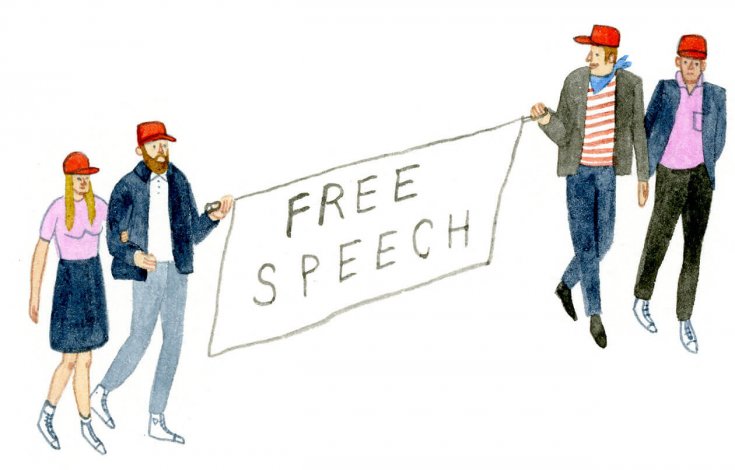
In the crude terms in which this conflict is often presented, our campuses are now being torn asunder by people who advocate for “social justice” and “safe spaces” on the one hand and people who champion “free speech” and “facts and reason,” on the other. The combatants on each side are typically rendered in sketchy caricature. In one corner are the queer, transgender, Indigenous, black-clad progressives, pulling fire alarms to break up controversial campus activities and labelling anyone with whom they disagree a neo-Nazi. In the other are white, male, heterosexual conservatives, railing against the political correctness and social-justice warriors (SJWs), barely able to eke out their favourite John Stuart Mill quote about liberty and freedom before they’re drowned out by, well, the wail of a fire alarm.
It’s a stark inversion of historical fortune and political norms that has unfolded across the West over the past decade. Granted: protests on the quad and academic policies about political correctness may be tempest-in-teapot stuff. But just as the campus melees of the 1960s helped normalize public skepticism about the Vietnam War, the current teapot tempests percolating in university life may well shape the broader intellectual, social, and political discourse, for better and worse.
In november 2017, Lindsay Shepherd, then a twenty-two-year-old graduate teaching assistant, made international headlines when she was censured for showing a clip of a public broadcaster’s current-affairs program in a Wilfrid Laurier University communication studies tutorial, in which University of Toronto psychology professor and bestselling self-help author Jordan Peterson expressed his opposition to Bill C-16: the (now passed) legislation adding gender identity and gender expression as protected categories in the Canadian Human Rights Act and Criminal Code. In the clip, Peterson said he would refuse to use gender-neutral pronouns if requested to do so by a nonbinary student and that any attempt to compel the use of gender-neutral pronouns amounted to curtailing free speech. As Shepherd explains over the phone, months later, she “wanted to make a larger societal point about how something innocuous, like grammar, can actually be politicized.”
A few days after her classroom screening, Shepherd was called to a meeting that included her academic supervisor and a representative from the university’s diversity and equity office, who told Shepherd she had created an unsafe learning environment for transgender students. Call it foresight, call it cunning, but Shepherd recorded the meeting. And, when the audio hit the media, she became, in her words, a “free-speech warrior.” The heart of the argument she made in that meeting could also serve as a motto for the surging campus free-speech movement: “In a university, all perspectives are valid.”This attitude has started to become more evident in public policy as well. About a year after this incident, newly elected Ontario premier Doug Ford’s Progressive Conservative government demanded that public colleges and universities, under threat of funding cuts, “implement and comply with a free speech policy that meets a minimum standard prescribed by the government.” In the United States, Donald Trump signed an executive order sending a similar message this spring.
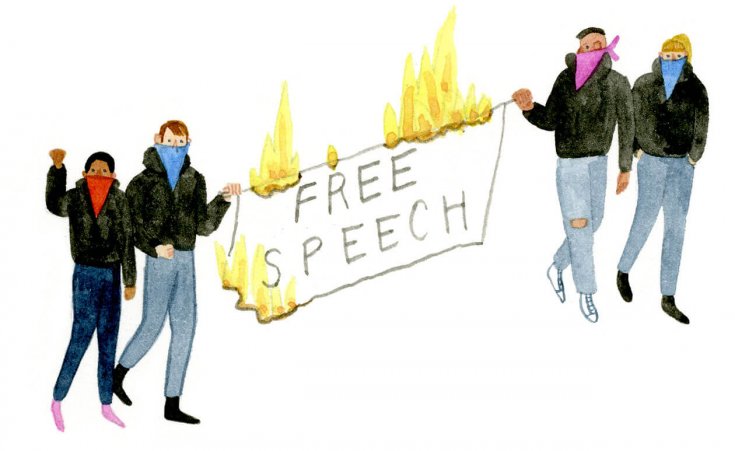
Many students roused by the intoxicating energy of campus politics are drawn to this all-perspectives-are-valid view of the university. But it is a historically novel one. “The goal of the university,” says Shannon Dea, a philosophy professor at the University of Waterloo whose research examines equity in the academy, “isn’t for everyone to get their participation sticker and to be able to advance their own opinion.” Since the Shepherd scandal and the subsequent renewal of the Canadian campus free-speech movement, Dea has become interested in how calls for unrestricted freedom of expression on campus compromise the historical role of universities. “There’s a cultural perception that the university in particular has a mission to foster freedom of expression,” Dea explains. “I think that this is based on a partial understanding.”
The “cultural perception” of the university is tricky to nail down. In their 2017 monograph on the history of universities and colleges, Universities and Colleges: A Very Short Introduction, David Palfreyman and Paul Temple describe student life, in generalized terms, as “an emancipatory experience.” Loosed from the tyranny of parental authority and the hierarchal pecking order of high school, the undergraduate becomes a boulevardier in the so-called marketplace of ideas, free to explore academic disciplines and theories, the adolescent intellect excited in turn.
In this sense, “the university” is not merely a collection of august brick buildings wreathed with creeping greenery but an experience: one that extends outside of labs and lecture halls and into pubs, parties, and dorm rooms where kids test their lung capacity with homemade bongs MacGyvered together from sawed-off pop bottles. It is here, in this notion of the university, that all perspectives may indeed be valid. In a free and open democracy, one should be able to preach about the perils of open borders or the tyranny of gender-neutral pronoun usage or how 9/11 was an inside job, at least as long as a given audience will tolerate it.
Then there’s a distinct historical and pedagogical understanding of the university not as an experience or a wooly intellectual amusement park but as an accredited institution of higher learning. “The distinctive mission of Canadian universities,” Dea explains, “is this notion of a guild of professors, who are experts in the scholarship, and they have jurisdiction over the academic direction of the university.” And it’s here that “freedom of thought, belief, opinion and expression,” as enshrined in the Canadian Charter of Rights and Freedoms, scrapes uncomfortably against the notion of academic freedom, which, as defined by Universities Canada, “must be based on institutional integrity, rigorous standards for enquiry and institutional autonomy.” In an article for the Canadian Philosophical Association website, Dea compares teaching on campus to working at a fast-food joint. If you’re hired to work at a Wendy’s, you can’t just tell customers that they’d be better served eating at a McDonald’s. (Well, you can. But your hypothetical Wendy’s boss would be within her rights to fire you for doing so.) Likewise, Dea writes, “If I have been assigned to teach a course on formal logic, I can’t spend every class instead talking about my own personal peccadillos on free-expression grounds.” Freedom of speech does not excuse crummy job performance.
It may be permitted, and even constitutionally guaranteed, to declare that the earth is actually flat within the looser, cultural, experiential notion of “the university.” But the same claim, issued in an undergraduate astronomy lecture, can reasonably be understood to contradict the mission of the university as academic institution. It is, perhaps, possible to maintain a delicate balance between these two incommensurate notions: we can hold out for Kant-inspired rigour in the classroom itself, while elsewhere on campus, the free-for-alls continue. And, indeed, some argue that the history of the university is the history of these divergent conceptions hanging together, however precariously. But the issue with the current wave of free-speech advocacy is that, in many cases, campus activities, like headline-grabbing events at which various groups host visiting speakers, are taking place at universities precisely because doing so lends the events and the ideas they champion a measure of pedigree: these are not serious efforts at intellectual engagement but actions by controversialists who risk sapping the very legitimacy they expect the university setting to confer. And, even more urgently, such speakers—and the rabble they so habitually rouse—are accused of jeopardizing the right of certain students to a serious, rigorous, safe academic experience.
In 2013, Carleton student Arün Smith made headlines for tearing down a “free-speech wall”—basically, a giant piece of paper on which students were invited to write whatever they pleased—erected by a student group called the Carleton Students For Liberty. Smith claimed the wall constituted an “act of violence” against LGBTQ students. (Among the potentially galling sentiments scrawled on the installation was, “Traditional marriage is awesome.”) “When I see people use words like ‘for liberty’ or ‘free-speech wall,’” Smith explains, “there’s an automatic, gut reaction that I get that there’s something more at play here.”
Indeed, the Carleton free-speech wall, and similar free-speech walls erected on Canadian campuses around the same time, were spearheaded in part by the Justice Centre for Constitutional Freedoms (JCCF), a non-profit “voice for freedom in Canada’s courtrooms” whose “mission is to defend the constitutional freedoms of Canadians through litigation and education.” Among its more high-profile donors is the Aurea Foundation, a charitable foundation by former Barrick Gold chairman Peter Munk, dedicated to the “political and economic foundations of freedom.” Canada Revenue Agency records show that Aurea also donates to public-policy think tanks the Frontier Centre for Public Policy and the Fraser Institute, both of which have been described as conservative and libertarian.
The JCCF is also listed as a dedicated partner of the Atlas Network, a US non-profit that advocates for free-market principles. Sir Antony Fisher, the British libertarian who founded the Atlas Economic Research Foundation in 1981, stated that the organization’s aim is simply “to litter the world with free-market think tanks.” JCCF’s president, John Carpay, a former candidate for the right-wing federal Reform Party of Canada and the right-wing Wildrose Party in Alberta who compared rainbow-patterned Pride flags to swastikas in a 2018 conference address, insists that his organization “has no opinions” on specific policy issues and that the money it receives from the Atlas Network amounts to little more than “a small annual grant.” But the seemingly innocuous verbiage of “liberty” and “freedom” belies, if not a direct partisan political agenda, a discernible ideological drift.
“In some cases, a student union or university authorities may shut down a free-speech wall or refuse to grant permission for one to be set up,” says Carpay, before breaking into a fit of amused laughter. “That makes the point right there!” There’s a certain hammer-meets-nail logic here: the free-speech groups set out to deliberately trigger certain students, who are, in fact, then triggered. It can feel, at times, like a juvenile burlesque of constitutional performance art, in which campus groups undertake certain initiatives (free-speech walls, controversial speakers) for no other reason than to test the permissible limits of free expression itself. Not only is the exercise of free expression not some end in itself, it is often used as a bulwark to rebuff intelligent and deeply felt criticism about what, exactly, is being expressed so freely. To (further) wit: since her breakout Laurier free-speech scandal, Lindsay Shepherd has fallen swiftly in step with the anti-“identity politics,” anti-“SJW” set, proceeding to launch an online database called Identity Grifting, which indexes “news articles and opinion pieces that superficially exploit identity + diversity so that the subject, author, or media organization can profit.”
These free-speech groups—along with the professors and non-profits that prop them up—also tend to maintain that they represent a persecuted minority. Jordan Schroeder, former president of the University of British Columbia’s Free Speech Club, says that “conservatism is most certainly a minority” on Canadian campuses. David Haskell, a Laurier professor who supported Lindsay Shepherd (both on campus and in multiple Toronto Star op-eds), likewise claims that “many” of his academic colleagues “are promoting a virulent brand of cultural Marxism” that advances an agenda of campus censorship. (Haskell declined to be interviewed by The Walrus for this article, writing that he would only comment in “an unedited broadcast format.”)
This line of argument, common among free-speech advocates, maintains that marginal opinions gain their moral authority precisely in virtue of their marginalization. But being discriminated against is not at all the same as being unfairly discriminated against. It is, for example, unjust to dismiss a student because they are Black, Indigenous, or transgender. It is quite another thing to do the same when they say something that is incorrect (like espousing contrarian views about vaccination or the factuality of the Holocaust). And while being wrong (or bigoted or plain ignorant) is not a crime in most open societies, one wonders why open displays of wrong-headedness (or bigotry or plain ignorance) should be tolerated in a university, of all places.
Students entering the academy aren’t oblivious to the foundational idea that they are joining a community governed by certain intellectual standards. On a drizzly late September Tuesday last fall, I popped into a conference being held at Carleton University in Ottawa called Always a Zero-Sum Game? Exploring the Tensions Between Academic Freedom and Anti-oppression. I was tipped off to the conference by Abigail Curlew, a doctoral student and transgender woman whose writing on free speech has seen her targeted by online harassment campaigns. Her research focuses on the ways in which trans-feminine activists, journalists, and scholars are policed and surveilled by far-right anti-trans interests. As she points out to me, “I can’t just say anything I want in papers I’m doing. I have to say things that align to various literatures, that make substantiated arguments, that have a rigorous analysis. All of that is held accountable to my committee. . . . All of them have the authority to tell me that what I’m saying is wrong and I need to rewrite everything.”
Curlew’s comments, to a large extent, mirror those of someone like Lindsay Shepherd, whose “open inquiry” (as she calls it) has been trammelled by her superiors. The difference is that Curlew makes the point not as a grievance but as a matter of institutional procedure. “When you get involved with free-speech debates, it’s very difficult to raise these issues without being accused of being a snowflake, or an SJW,” she tells me. And for those who are on the side of more latitude, “once you associate as a free speecher, you’re seen as someone on the far right.” Curlew also tells me that, even in its planning stages, the conference was “volatile” and that these issues “are inherently messy and may not have an actual resolution.”
At first blush, the protests that meet far-right speakers when they come to speak on campus—Milo Yiannopoulos’s visits to Berkeley are perhaps the best-known recent example—reek of a great reversal of history. But it is only superficially a reversal. Queer students afflicted by “traditional marriage is awesome” scrawls, students of colour targeted by “It’s Okay to Be White” flyers posted at Wilfrid Laurier University, transgender and nonbinary youth aggrieved by Jordan Peterson’s star-making refusal to use gender-neutral pronouns—they’re all fighting for the same basic sense of recognition that civil-rights protesters were struggling for in the ’60s.
The great irony of today’s free-speech absolutism is that it smothers so much speech by making so many students (like transgender students in the wake of the Lindsay Shepherd incident) feel afraid or bullied. If absolutely anything is fair game—if you can say what you will—then the people who will speak loudest will almost necessarily be those are most secure, who have the least to lose. This is why students like Curlew, who recognize acceptable limits on speech and expression, are the true heirs to the campus free-speech movement: the expression of politics may have changed, but the political program remains largely the same.
In 1992, Canadian philosopher Charles Taylor explored the intellectual, emotional, and political necessity of mutual acknowledgement within a shared sphere of liberal democracy. In the essay “The Politics of Recognition,” Taylor writes that “the projection of an inferior or demeaning image on another can actually distort and oppress, to the extent that the image is internalized.” When, for example, a visiting speaker preaches white nationalism in an immigrant community, it is not an intellectual argument to be parried but a form of domination that deliberately seeks to undermine an individual’s sense of identity. This basic sense of recognition is also, like free speech, constitutionally assured, by the Charter’s “equal protection and equal benefit of the law without discrimination.” A focus on freedom of expression has a tendency to inflate its relative importance, such that it can supersede that other right.
The Carleton symposium on the friction between free expression and safe spaces generated plenty of suggestions for breaking the deadlock: from law professors avoiding material in their classes that could be disruptive for survivors of sexual assault (about, say, the gory particulars of the Paul Bernardo case) to the development of new pedagogical tools for accommodating students whose anxiety may impair their learning (such as, for example, encouraging more written assignments and fewer stressful in-class discussions). The solutions are there, in the nuanced back and forth of an academic conference. They’re just not as apparent when the conflict of the faculties is rendered as a war between egghead logicians preaching constitutional freedoms and heart-strong “social-justice warriors” more preoccupied with newfangled principles of antioppression.
Shannon Dea has been around a bit longer than the new class of free-speech warriors and watched as these microcosmic culture wars have raged out, only to recede from public memory. This, she says, was the case in the ’90s when debates of campus “political correctness” first appeared. “It looks to me like a cycle that occurs,” says Dea. “From my point of view, at the very least, I think university scholars and university administrators have to do a much better job of, first of all, understanding the mission of the university and the role of academic freedom within that mission—and then doing a better job of having a conversation with the public about those things.”
In 1970, the Canadian literary theorist Northrop Frye gave a lecture titled “The Definition of a University” (it was later published in his essay collection Divisions on a Ground). In it, he distills a set of “intellectual virtues” for higher education, which are also broadly applicable as general moral principles. “Experiment and reason and imagination cannot be maintained without wisdom,” writes Frye, “without charity, without prudence, without courage, without infinite sympathy for genuine idealism and infinite patience with stupidity, ignorance and malice.”
Evangelizing infinite patience for stupidity offers no comfort to students whose basic rights to recognition, in the form of something as seemingly simple as being addressed by the pronouns they designate, are being sideswiped by self-styled absolutists preaching the ethic of free expression for its own sake. But what is encouraging in Frye’s view is not some wishy-washy nonsense about riding the storm out and waiting for the pendulum of history to swing back towards progress. It’s that it resists the catastrophic rhetoric of the university—a place constructed of old brick and ancient ideas to advance the pursuit of both truth and understanding—as a proxy battlefield in some larger culture war.
The university’s roles as a home for mutual recognition and as a marketplace of ideas were not, to Frye, mutually exclusive. Minds and hearts were not conflicting, but complementary, faculties. This is that delicate balance that demands to be restored in order to reinvest the academy with both its scholarly and cultural integrity. It is in the hallowed lecture halls and pot-stinky dorm rooms of the university, in both the stuffy institutional context and the more woozily defined space of “campus life” where hearts and minds open together, where the moral conscience is nurtured in good faith—or is meant to be, anyway.

